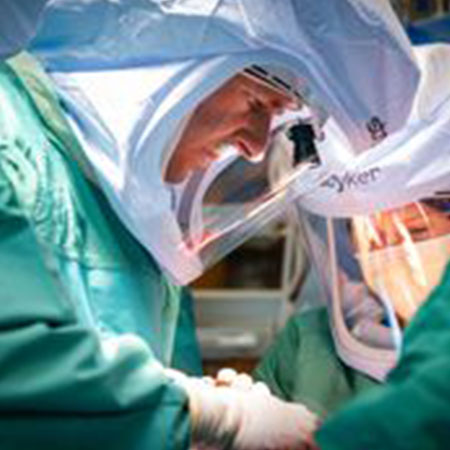
It wasn’t that long ago that joint replacement patients typically spent up to five days in the hospital after their surgery to recover. With advancements in technology, anesthesia, pain control and physical therapy, many patients now have the option to go home the same day as their procedure. “We’ve had a lot of data in a short amount of time showing it can be done safely,” said Dr. Craig Morrison, an orthopedic surgeon with Southern Joint Replacement Institute.
Dr. Morrison says the transition to outpatient surgery started with improvements in areas that typically kept people in the hospital overnight. “Advancements in anesthesia techniques, multimodal pain protocol and nerve blocks help keep patients comfortable so they don’t have to stay in the hospital for pain control,” said Dr. Morrison. He adds that physical therapy protocols have also been adapted, so that patients can feel comfortable going home the same day.
“We have been doing this for more than a decade,” said Dr. Robert Otto, an orthopedic surgeon at Southern Joint Replacement Institute. “Patients are up and walking the same day as surgery, navigating stairs and transferring to the car.” Education and preparation before surgery are a big reason that outpatient joint replacement is successful since patients and their families know what to expect. In addition, patients work with nurse navigators to set up everything they need at home, including medication, walkers and canes. Navigators also follow-up with patients to ensure the transfer to the home environment is smooth.
While outpatient joint replacement surgery has been around for many years, it has become a more popular option since 2020. “The pandemic in a lot of markets, including Nashville, accelerated outpatient surgery because there was a need in the market. Patients wanted to have their procedures done and not stay in the hospital,” said Dr. Morrison. Many patients also enjoy the efficiency of surgery centers because parking and registration are much easier. “There is not a difference in outcomes between inpatient and outpatient. We are not finding any difference in complication rates or readmission to the hospital,” said Dr. Morrison.
Physicians at Southern Joint Replacement Institute attribute the success of outpatient surgery to their dedicated team who specialize in joint replacement surgery. “That’s been the biggest thing to make sure everyone involved in the care of the patient is on the same page. Operating room, sterilization, nurses, therapist, transport, food team - everyone is working together to provide the best care for the patient,” said Dr. Otto.
Dr. Scott Curry adds that the expectations do not change whether they are in a hospital or outpatient environment. “The outcomes are similar because the processes and policies are the same. The same things we are doing in a surgery center are the same things we are doing in the hospital because that’s what is best for the patient,” said Dr. Curry. The goal of the entire team is to provide the highest quality care no matter what surgical environment the patient chooses. “It is truly a team effort. Our commitment is to the safety of our patients, while ensuring they are prepared with everything they need to have a successful recovery,” said Dr. Curry.
There are several factors that physicians take into account before considering an outpatient joint replacement. The first is the patient’s overall medical health or any heart issues that may need to be monitored by medical teams in the hospital. “They also need to have family, friends or neighbors who can help in the days following the surgery once they are home,” said Dr. Otto. “A strong support system is important to help with day-to-day activities like cooking and cleaning.”
If you are considering a joint replacement surgery, your physician will help you determine if outpatient surgery is an option based on your preferences and medical history. Southern Joint Replacement Institute has five different locations across Middle Tennessee including Davidson, Dickson, Obion, Rutherford and Williamson Counties. In many cases, patients can have surgery at a hospital or surgery center closest to their home. For more information or to make an appointment, call (615) 342-0038 or go to SJRI.com.